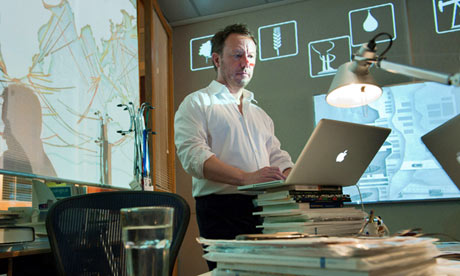Wallace Heim writes:
Michael Billington, in his nomination of Ten Billion as the best theatre event of 2012, claims that all the people he knows who saw the production found it life-changing. From my unscientific poll of the dozen people I know who saw the production, including myself, it’s possible we were in a different theatre. The lecture was well-crafted, the production tight, but the event was neither moving, informative or motivating. It was ‘old news’, a ‘first-year introductory lecture’, ‘Al Gore without the cherry picker’.
Michael Billington, in his nomination of Ten Billion as the best theatre event of 2012, claims that all the people he knows who saw the production found it life-changing. From my unscientific poll of the dozen people I know who saw the production, including myself, it’s possible we were in a different theatre. The lecture was well-crafted, the production tight, but the event was neither moving, informative or motivating. It was ‘old news’, a ‘first-year introductory lecture’, ‘Al Gore without the cherry picker’.
Billington’s lauding of the production is encouraging. That
he, and others, were deeply affected is even more so, although one wonders what
he has avoided reading or seeing for the past 20 years if the information presented
was shocking. But Billington finds that it is not merely the accumulation of
statistics, but the presence - the performance - of Stephen Emmott, the
verifiable scientist, the speaker with a creditable reputation outside the
theatre, that gave the production its urgency.
For this audience, the fluid realm of belief and disbelief
that makes theatre work had to break down for the shock of climate instability
to be heard. At the same time, the very theatrical occasion of sitting in that
darkened room redolent of emotions of past productions, listening to another
human speak, heightened any effect.
Asking again of those who found the production lacking, I
found each person had, in their experience outside the theatre, at least one, if not many moments when the
numbers add up, when the terror hits, when someone trusted speaks about a
future irreconcilable with what one could bear. These events can be motivating
and if Ten Billion provided that for some, then theatre’s role as educator has
been met.
But if you’ve already had that experience, theatre is where
you want to go to understand it, and a collocation of facts will not do that.
This is a far more confused territory, requiring human imagination and many
avenues of intelligence, deliberation, conflict and consent. It requires doing something like the processes of science,
itself – its questioning and cross-questioning, experimentation, doubt and
informed agreement.
Theatre may not be the place to present firm courses of
action; Emmott’s advice to get a gun falls especially short. Conventional forms
of theatre may, or may not, be adequate to the combination of reality and
fiction that understanding climate change demands. But theatre, or something
like it, continues to be a place where collectively, humans find a way through.
There will continue to be many kinds of productions for many kinds of
audiences. The hunger for a theatre by the audience that gets the facts but
wants more continues to be strong.











No comments:
Post a Comment